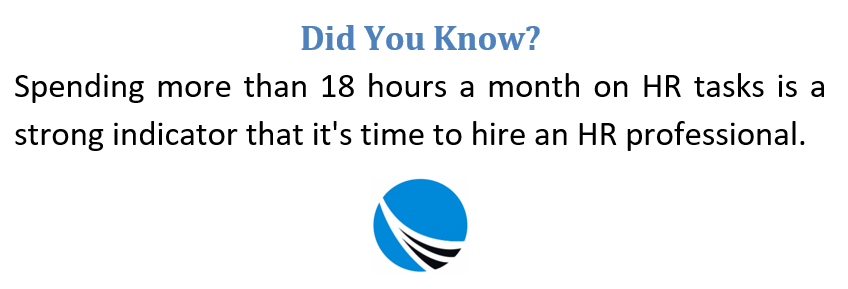Managing a growing team is no small feat. As your business expands, so do the complexities of managing people — hiring, payroll, compliance, culture-building, and more. These responsibilities can quickly become overwhelming for founders or managers juggling multiple tasks. If you’re starting to wonder whether it’s time to bring on a dedicated HR professional, you’re not alone. Below are some major indicators that it might be the right move.

You’re Constantly Pulled Away from Core Business Activities
In the early days of a small business, handling HR tasks yourself might seem like a cost-saving strategy. It may even feel manageable at first. But as your company scales, the hours spent on administrative tasks like recruiting, onboarding, and managing employee queries can quickly pile up.
If you’re spending the equivalent of several full working days each month dealing with employee-related matters, it may be time to delegate. You might find your attention drifting away from revenue-generating activities or strategic planning simply because you’re fielding time-off requests or processing payroll.
Hiring a dedicated HR person doesn’t just free up time—it allows you to focus on growth, innovation, and leadership.
Navigating Employment Regulations Feels Overwhelming
Staying compliant with labor laws is critical for avoiding penalties and legal trouble. But employment laws are complicated, vary by location, and often change. For business owners managing HR without a legal background, this area can be daunting.
Are you confident that your employee handbook aligns with national regulations? Are you sure your hiring and firing processes won’t raise red flags? If not, you’re not alone—and that’s a good reason to bring in someone who knows the ins and outs of compliance.
An HR professional can help your business steer clear of avoidable legal risks and ensure your policies and practices are up-to-date and legally sound.
Talent Acquisition and Development Are Falling Behind
Hiring the right people—and keeping them—is one of the most important factors in a business’s success. But effective recruitment, onboarding, and employee development require planning, time, and expertise.
If you’ve noticed a pattern of high turnover, difficulty filling roles, or disengaged employees, it may be due to an underdeveloped HR process. New hires who don’t receive proper training or support are more likely to leave, while a lack of professional development opportunities can result in stagnation for your existing team.
A skilled HR hire can bring structure to your hiring process, implement development plans, and create a consistent, welcoming onboarding experience.

Business Growth Has Outpaced Your People Systems
Every new hire adds a layer of complexity to your operations. If your team has grown quickly but your HR systems haven’t kept pace, cracks can start to show. Policies might be unclear or inconsistently applied. Communication could break down between teams. Performance reviews might be sporadic or nonexistent.
These issues are often early warning signs that your business is growing faster than your internal structure can handle. When your team size hits 25, 40, or 50 employees, the absence of a dedicated HR function becomes more noticeable—and more risky.
Having someone in-house to manage people operations can help ensure that your growth doesn’t come at the expense of organization, morale, or legal compliance.
You’re Unsure How Competitive Your Compensation Really Is
Compensation isn’t just about paying people—it’s a strategic tool for retaining top performers and attracting new talent. But benchmarking salaries, structuring benefit packages, and navigating payroll complexities take time and expertise.
If you’re hearing feedback that your compensation isn’t competitive, or you’re struggling to retain good employees, it could be a sign that your approach needs updating. Similarly, manually handling payroll and benefits for a growing team increases the chances of errors and delays.
An HR expert can help you evaluate market compensation data, create compelling packages, and streamline your payroll systems—keeping your employees satisfied and your operations compliant.
You Want to Foster a Strong, Consistent Workplace Culture
Every business has a culture—whether it’s nurtured intentionally or not. Culture influences everything from productivity to employee retention to your company’s public reputation. But managing culture effectively requires more than good intentions.
Are employees receiving recognition for their efforts? Are company values reflected in everyday behavior? Is there a system for resolving conflicts and offering feedback?
An HR professional plays a key role in maintaining and evolving workplace culture. They help formalize values, introduce engagement programs, support communication, and ensure that the internal experience aligns with your business goals.
If you want your workplace to be known for transparency, collaboration, or innovation, having an HR partner to help build that culture is invaluable.
You’re Hesitating Out of Fear or Uncertainty
Even when the signs are clear, many business owners hesitate to hire an HR person. Sometimes, the fear comes from feeling unsure about giving up control. Other times, it’s concern over cost or hiring the wrong person.
These concerns are valid, but they shouldn’t stop you from getting the help your business needs. If you’ve reached a point where HR responsibilities are limiting your effectiveness or growth, hiring someone skilled in people operations might be one of the most empowering decisions you make.
Steps to Bring in Your First HR Hire
When you’ve decided it’s time to hire someone for HR, the process shouldn’t be rushed. Here’s how to approach it thoughtfully:
Understand Your Specific Needs
Every company’s HR needs are different. Make a list of tasks you currently handle, areas you’re struggling with, and what responsibilities you want the new hire to take on. You might need someone focused on recruiting, or you may need a generalist who can handle payroll, employee engagement, and compliance.
Create a Well-Rounded Job Description
Crafting a job description is your first impression with candidates. Focus not just on responsibilities but also on the kind of work culture you want to build. Be clear about the expectations, flexibility, and opportunities for growth within the role.
Cast a Wide Net
Post the position on job boards, leverage your network, and ask your team for referrals. Consider reaching out to professional groups or attending HR events if you’re looking for someone experienced in your industry.
Interview for Skills and Culture Fit
The ideal HR person should understand employment laws and HR software—but they should also connect with your company’s mission and values. Ask questions that reveal how they’ve built policies, improved employee retention, or handled sensitive issues in the past.
Onboard Your HR Hire Thoughtfully
Just as they’ll eventually manage the onboarding process for others, your HR hire needs a proper welcome. Introduce them to key staff, give them access to systems, and clarify short- and long-term goals. A good start sets them up for success.
Other Ways to Manage HR Before You Hire In-House
If your business isn’t quite ready to hire a full-time HR employee, there are other options available. For example, you might assign HR tasks to a trusted employee with some experience or hire a part-time consultant.
Another approach is to use external HR providers. These range from simple software platforms to full-service firms. Some companies choose professional employer organizations (PEOs) that handle everything from payroll to benefits administration through a shared-employment model. Others use HR outsourcing firms (HROs) to handle specific needs like compliance or hiring.
While not a permanent solution, these services can help bridge the gap until you’re ready to bring someone in-house.
Final Thoughts: Invest in Your People, Invest in Your Future
You built your company with passion, determination, and vision. As you grow, your success will increasingly depend on how well you support and manage your people. Delegating HR responsibilities to a capable professional allows you to lead more effectively, develop your team, and prepare for the next chapter in your journey.
Hiring your first HR person isn’t just a sign of growth—it’s a strategic move toward creating a more resilient and scalable business. If the signs are pointing that way, it might be time to act.

Frequently Asked Questions
Why is HR compliance important for small businesses?
Failure to comply with labor laws can lead to legal penalties. An HR expert helps ensure policies meet federal, state, and local regulations.
How does an HR professional improve recruitment and onboarding?
They streamline hiring, enhance onboarding experiences, and implement development plans that increase retention and employee engagement.
What role does HR play in managing business growth?
As a team expands, HR sets up systems for communication, performance evaluation, and workplace policies to support sustainable growth.
How can HR help with compensation challenges?
HR professionals analyze market data to create competitive salary structures and manage payroll efficiently to retain top talent.
What are the alternatives to hiring a full-time HR person?
Businesses can use part-time contractors, delegate tasks internally, or outsource to PEOs or HRO services until they’re ready for a permanent hire.
